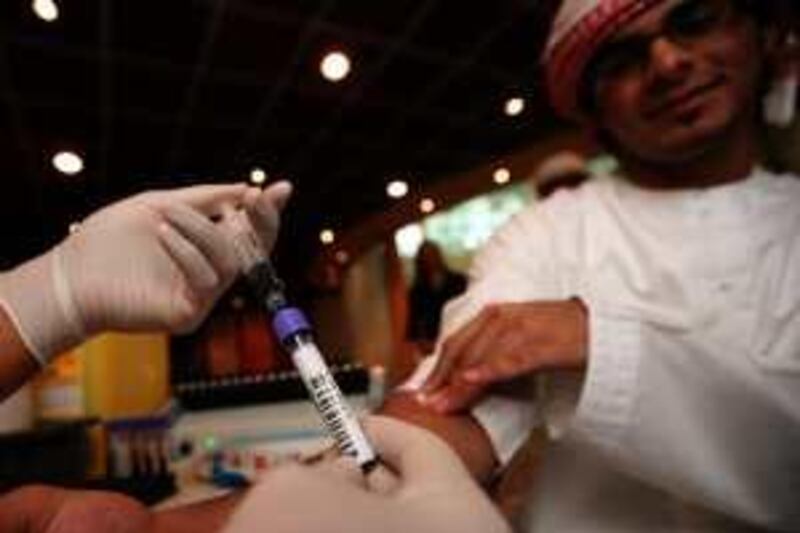DUBAI // There are 260 known genetic diseases in the UAE. That total was attained after researchers at the Centre for Arab Genomic Studies, based in Dubai, last year identified another 16 disorders in the Arab population of the Emirates. The majority of the diseases are single-cell disorders caused by a mutation in a single gene. Sickle-cell disease and cystic fibrosis, for example, are both single-cell diseases.
Disorders related to congenital malformations or metabolic disorders were also identified. Among the 16 disorders identified last year was Gaucher's disease, which can cause an enlarged spleen, liver malfunction and skeletal problems. Dr Mahmoud Taleb al Ali, the director of the genomics centre, said although the number of identifiable diseases is going up, that does not mean the number of sufferers is on the increase.
"There is never a decrease in the types of diseases," he said. "You may see a decrease in terms of the numbers of people affected, but the number of types will always increase all over the world." Dr al Ali was speaking on the sidelines of the third Pan Arab Human Genetics Conference, which took place in Dubai on Saturday and Sunday. He said better knowledge and technologies, as well as better screening, had helped identify many of the diseases on the database.
Genetic testing is also common in the Emirates and every UAE national must be screened before marrying. This testing can show whether an individual has an inherited disposition to a certain disease, such as diabetes, or tell a couple whether they are likely to have a child affected by a genetic disease. "We have done more literature research as well as physical research, so these diseases may have existed in the past but have never been recorded," Dr al Ali said.
"It is normal in this part of the world to have a high number, but this high number is not normal. We have many people coming from all over the world, it is not just the local population." Dr Yousef Abdulrazzaq, a paediatrician and neurologist at the Faculty of Medicine and Health Sciences at UAE University in Al Ain, also emphasised that the main way to prevent the diseases was regular screening, particularly before marriage.
"This is the only way to prevent it; we have been doing premarital screening and we have to continue with that," Dr Abdulrazzaq said. "Some of the diseases are very rare, which is why screening is crucial." Contact with certain toxic chemicals or materials, such as lead or nuclear energy particles, can also cause mutations, he said. The most common social factor contributing to the prevalence of genetic diseases is consanguineous marriages.
The prevalence of Down syndrome, a chromosomal disorder, in the Emirates is almost double the global average, at 21.4 babies per 100,000 population. And about four to eight per cent of the UAE population is said to carry the thalassaemia gene, an inherited disorder in which the body produces less haemoglobin than normal. Haemoglobin allows red blood cells to carry oxygen around the body. Low levels can cause anaemia, which leads to tiredness and fatigue.
Dr Ghazi Tadmouri, the assistant director of the genomics center, said one of the centre's main roles is to create a database that identifies all genetic disorders across the Middle East, "from Iraq to Morocco". "Genetic diseases range from blood disorders like sickle cell diseases, thalassaemia, haemophilia and haemoglobin disorders, all of which are rampant, to cancers, or genetic disorders related to the environment and lifestyle," said Dr Tadmouri.
The UAE's database, said Dr Tadmouri, relies on comprehensive surveys that are carried out regularly, and incorporates diseases highlighted in medical reviews and journals. The Centre for Arab Genomic Studies, which is a division of the Sheikh Hamdan Award for Medical Sciences, organised the conference. * The National, with additional reporting by May al Hamli





